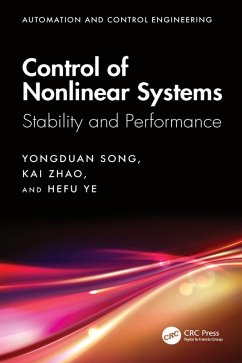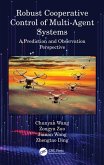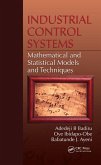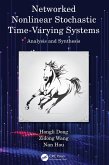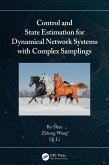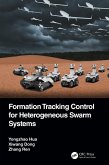52,95 €
52,95 €
inkl. MwSt.
Sofort per Download lieferbar

26 °P sammeln
52,95 €
Als Download kaufen

52,95 €
inkl. MwSt.
Sofort per Download lieferbar

26 °P sammeln
Jetzt verschenken
Alle Infos zum eBook verschenken
52,95 €
inkl. MwSt.
Sofort per Download lieferbar
Alle Infos zum eBook verschenken

26 °P sammeln
- Format: PDF
- Merkliste
- Auf die Merkliste
- Bewerten Bewerten
- Teilen
- Produkt teilen
- Produkterinnerung
- Produkterinnerung

Bitte loggen Sie sich zunächst in Ihr Kundenkonto ein oder registrieren Sie sich bei
bücher.de, um das eBook-Abo tolino select nutzen zu können.
Hier können Sie sich einloggen
Hier können Sie sich einloggen
Sie sind bereits eingeloggt. Klicken Sie auf 2. tolino select Abo, um fortzufahren.

Bitte loggen Sie sich zunächst in Ihr Kundenkonto ein oder registrieren Sie sich bei bücher.de, um das eBook-Abo tolino select nutzen zu können.
The theory of nonlinear control systems has grown and flourished since the 1980s. Numerous texts of varying degrees of difficulty have been published on this topic.
- Geräte: PC
- mit Kopierschutz
- eBook Hilfe
Andere Kunden interessierten sich auch für
![Metaheuristics for Resource Deployment under Uncertainty in Complex Systems (eBook, PDF) Metaheuristics for Resource Deployment under Uncertainty in Complex Systems (eBook, PDF)]() Shuxin DingMetaheuristics for Resource Deployment under Uncertainty in Complex Systems (eBook, PDF)50,95 €
Shuxin DingMetaheuristics for Resource Deployment under Uncertainty in Complex Systems (eBook, PDF)50,95 €![Robust Cooperative Control of Multi-Agent Systems (eBook, PDF) Robust Cooperative Control of Multi-Agent Systems (eBook, PDF)]() Chunyan WangRobust Cooperative Control of Multi-Agent Systems (eBook, PDF)50,95 €
Chunyan WangRobust Cooperative Control of Multi-Agent Systems (eBook, PDF)50,95 €![Energy-Efficient Electrical Systems for Buildings (eBook, PDF) Energy-Efficient Electrical Systems for Buildings (eBook, PDF)]() Moncef KrartiEnergy-Efficient Electrical Systems for Buildings (eBook, PDF)130,95 €
Moncef KrartiEnergy-Efficient Electrical Systems for Buildings (eBook, PDF)130,95 €![Industrial Control Systems (eBook, PDF) Industrial Control Systems (eBook, PDF)]() Adedeji B. BadiruIndustrial Control Systems (eBook, PDF)115,95 €
Adedeji B. BadiruIndustrial Control Systems (eBook, PDF)115,95 €![Networked Nonlinear Stochastic Time-Varying Systems (eBook, PDF) Networked Nonlinear Stochastic Time-Varying Systems (eBook, PDF)]() Hongli DongNetworked Nonlinear Stochastic Time-Varying Systems (eBook, PDF)48,95 €
Hongli DongNetworked Nonlinear Stochastic Time-Varying Systems (eBook, PDF)48,95 €![Control and State Estimation for Dynamical Network Systems with Complex Samplings (eBook, PDF) Control and State Estimation for Dynamical Network Systems with Complex Samplings (eBook, PDF)]() Bo ShenControl and State Estimation for Dynamical Network Systems with Complex Samplings (eBook, PDF)46,95 €
Bo ShenControl and State Estimation for Dynamical Network Systems with Complex Samplings (eBook, PDF)46,95 €![Formation Tracking Control for Heterogeneous Swarm Systems (eBook, PDF) Formation Tracking Control for Heterogeneous Swarm Systems (eBook, PDF)]() Yongzhao HuaFormation Tracking Control for Heterogeneous Swarm Systems (eBook, PDF)46,95 €
Yongzhao HuaFormation Tracking Control for Heterogeneous Swarm Systems (eBook, PDF)46,95 €-
-
-
The theory of nonlinear control systems has grown and flourished since the 1980s. Numerous texts of varying degrees of difficulty have been published on this topic.
Dieser Download kann aus rechtlichen Gründen nur mit Rechnungsadresse in A, B, BG, CY, CZ, D, DK, EW, E, FIN, F, GR, HR, H, IRL, I, LT, L, LR, M, NL, PL, P, R, S, SLO, SK ausgeliefert werden.
Produktdetails
- Produktdetails
- Verlag: Taylor & Francis eBooks
- Seitenzahl: 326
- Erscheinungstermin: 14. August 2024
- Englisch
- ISBN-13: 9781040098752
- Artikelnr.: 72280087
- Verlag: Taylor & Francis eBooks
- Seitenzahl: 326
- Erscheinungstermin: 14. August 2024
- Englisch
- ISBN-13: 9781040098752
- Artikelnr.: 72280087
- Herstellerkennzeichnung Die Herstellerinformationen sind derzeit nicht verfügbar.
Yongduan Song received the Ph.D. degree in electrical and computer engineering from Tennessee Technological University, Cookeville, TN, USA, in 1992. He held a tenured Full Professor with North Carolina A&T State University, Greensboro, NC, USA, from 1993 to 2008, and a Langley Distinguished Professor with the National Institute of Aerospace, Hampton, VA, USA, from 2005 to 2008. He is currently the Dean of the Institute of Artificial Intelligence, Chongqing University, Chongqing, China. He was one of the six Langley Distinguished Professors with the National Institute of Aerospace (NIA), Hampton, VA, USA, and the Founding Director of Cooperative Systems with NIA. His current research interests include intelligent systems, guidance navigation and control, bio-inspired adaptive, and cooperative systems.
Kai Zhao received the Ph.D. degree in control theory and control engineering from Chongqing University, Chongqing, China, in 2019. He held research positions with Department of Computer and Information Science at the University of Macau, and Department of Electrical and Computer Engineering at the National University of Singapore. Since May 2023 he has been an associate professor at School of Automation, Chongqing University, China.
Hefu Ye received the B.Eng. degree from the School of Information Science and Engineering, Harbin Institute of Technology, Harbin, China, in 2019. He is currently pursuing the Ph.D. degree with the School of Automation, Chongqing University, Chongqing, China. During October 2022 and 2023, he was a joint Ph.D. at the School of Electrical and Electronic Engineering, Nanyang Technological University, Singapore. His research interests include robotic systems, robust adaptive control, prescribed performance control, and prescribed-time control. Mr. Ye is an active Reviewer for many international journals, including the IEEE Transactions on Automatic Control,
IEEE Transactions on Neural Networks and Learning Systems, and IEEE Transactions on Systems, Man, and Cybernetics: Systems.
Kai Zhao received the Ph.D. degree in control theory and control engineering from Chongqing University, Chongqing, China, in 2019. He held research positions with Department of Computer and Information Science at the University of Macau, and Department of Electrical and Computer Engineering at the National University of Singapore. Since May 2023 he has been an associate professor at School of Automation, Chongqing University, China.
Hefu Ye received the B.Eng. degree from the School of Information Science and Engineering, Harbin Institute of Technology, Harbin, China, in 2019. He is currently pursuing the Ph.D. degree with the School of Automation, Chongqing University, Chongqing, China. During October 2022 and 2023, he was a joint Ph.D. at the School of Electrical and Electronic Engineering, Nanyang Technological University, Singapore. His research interests include robotic systems, robust adaptive control, prescribed performance control, and prescribed-time control. Mr. Ye is an active Reviewer for many international journals, including the IEEE Transactions on Automatic Control,
IEEE Transactions on Neural Networks and Learning Systems, and IEEE Transactions on Systems, Man, and Cybernetics: Systems.
Part 1. Fundamentals of Nonlinear Systems. 1. Introduction. 2. Fundamentals of Lyapunov Theorem. 3. Nonlinear Design Methods and Tools. Part II Control of Nonlinear Systems. 4. Control of First-order Systems. 5. Control of Normal-form Systems. 6. Control of Strict-feedback Systems. 7. Control of MIMO Systems. Part III Performance/Prescribed-time Control. 8. Accelerated Adaptive Control. 9. Control with Exponential Convergence and Prescribed Performance. 10., Finite-time Control. 11. Practical Prescribed-time Control. 12. Prescribed-time Stabilization Control. 13. Prescribed-time Tracking Control.
Part 1. Fundamentals of Nonlinear Systems. 1. Introduction. 2. Fundamentals of Lyapunov Theorem. 3. Nonlinear Design Methods and Tools. Part II Control of Nonlinear Systems. 4. Control of First-order Systems. 5. Control of Normal-form Systems. 6. Control of Strict-feedback Systems. 7. Control of MIMO Systems. Part III Performance/Prescribed-time Control. 8. Accelerated Adaptive Control. 9. Control with Exponential Convergence and Prescribed Performance. 10., Finite-time Control. 11. Practical Prescribed-time Control. 12. Prescribed-time Stabilization Control. 13. Prescribed-time Tracking Control.
